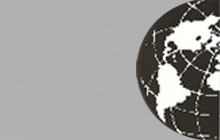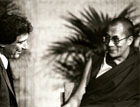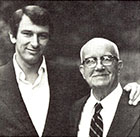The support of the Werner Erhard Foundation made possible groundbreaking conversations between leaders, scholars and officials from virtually all parts of the world in the fields of human achievement and transformation. As a result of this support exchange programs were launched that provided new ground for international cooperation.
One such program was the US/USSR Project, launched by Werner Erhard and the Werner Erhard Foundation in 1979 and designed as an educational exchange to explore the principles of communication, management, and creative thinking with the people of what was then the Soviet Union. After several delegate exchanges, in 1984 Werner Erhard conducted the first of many courses and lectures in Moscow under the auspices of the Znaniye (All Union Knowledge) Society (the prime vehicle for adult education in the former Soviet Union).
In 1988 the Znaniye Society took steps to extend the availability of these programs in the U.S.S.R. A brochure describing the project stated:
“Radically new, non-traditional solutions will need to play a big role in the perestroika of our economic, social and political systems. Only solutions of this class will allow us to reach our goals. But solutions at this level demand that we break through the habitual contours of our thinking so that we can see new possibilities and new methods of addressing theses issues."
“In this regard, the technology offered by (The Werner Erhard Foundation) is of immediate and practical interest to a broad audience of Soviet people and it would be valuable to study and master its methodology and practice.”
To this end, independent of the Foundation, avenues for continuing this exchange between the people and organizations of the U.S. and the new Commonwealth of Soviet Republics were expanded. For example a series of videotapes was designed to make this work widely available to the Soviet public over a sustained period of time.
In April 1990 Werner Erhard traveled to Moscow to lead a series of courses. Afterwards he wrote, "The USSR we found on this visit is at an historical crossroads...They are thirsty for new ways of looking at life, and at the same time discriminating about what they are going to take on, with an intelligent wariness about engaging in the sweeping experiments as they had over 70 years ago. There is a very courageous reassessment of the past going on, in which people are coming to grips with both the enormous costs of their experiment, which resulted in the deaths and destruction of the lives of millions of people, while at the same time acknowledging the courage that it took to engage in that experiment and the original intention of that experiment, which was to make life more humane for ordinary people. It is in that context that people are looking at the work we are engaged in. There seems to be a great deal of interest in exploring this work as a possibility for supporting the process that the Soviet Union is going through." Upon his return to the United States, Werner Erhard appeared on CNN, The Financial News Network and CNBC to discuss his work in the Soviet Union.
At this time in history dramatic changes were taking place across the landscape of the Soviet Union. On September 4, 1991, US Secretary of State James Baker articulated five basic principles that would guide U.S. policy toward the emerging republics: self-determination consistent with democratic principles, recognition of existing borders, support for democracy and rule of law, preservation of human rights and rights of national minorities, and respect for international law and obligations. The basic message was clear—if the new republics could follow these principles, they could expect cooperation and assistance from the United States. Baker met with Gorbachev and Yeltsin in an attempt to shore up the economic situation and develop some formula for economic cooperation between the republics and Russia, as well as to determine ways to allow political reforms to occur in a regulated and peaceful manner.
On December 25, 1991, the Soviet hammer and sickle flag lowered for the last time over the Kremlin, thereafter replaced by the Russian tricolor. People all over the world watched in amazement at this relatively peaceful transition from former Communist monolith into multiple separate nations.
In 1993 Erhard returned to Moscow to work with the newly independent Russian state members who were involved in creating the first Russian parliament.
Comments from participants of the courses:
"Werner Erhard's work is especially important for us because we are standing at the threshold of very big changes. Our harsh determinism is so deeply embedded in us that the thinking of Werner Erhard about, for example, the need to make mistakes, we at first hear as heresy. But later it is possible to see this as luminously true and valid. This is a very empowering perspective." - U.E.Sushilov, general director, machine building factory.
"Mr. Erhard is not only a coach and is not only giving away information, but is also showing people a possible way of relating to life. People in our country do not know how to relate either to themselves or to their lives. They say they want change, but they really don't, as I discovered when honestly looking at myself after Mr. Erhard's course. What I found most useful for myself is the whole idea of our responsibility for creating our own future. We feel that there will be an endless demand for Mr. Erhard's work... Dr. G.V. Badeeva, Vice Rector, Academy of the National Economy
Read more about Werner Erhard's 1990 trip to Moscow and Werner Erhard in the USSR



